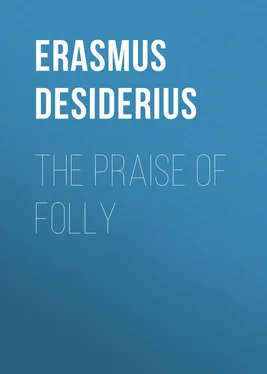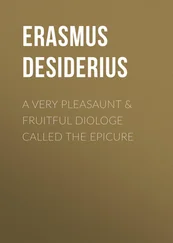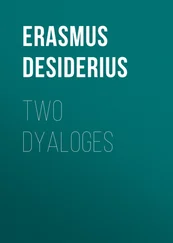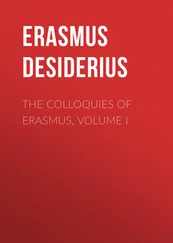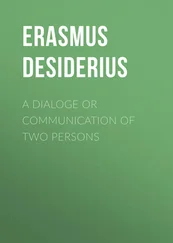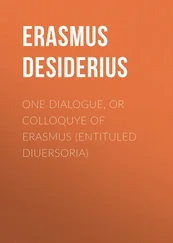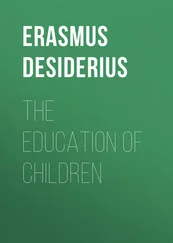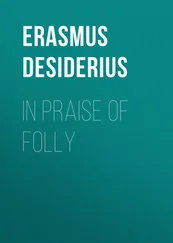Desiderius Erasmus - The Praise of Folly
Здесь есть возможность читать онлайн «Desiderius Erasmus - The Praise of Folly» — ознакомительный отрывок электронной книги совершенно бесплатно, а после прочтения отрывка купить полную версию. В некоторых случаях можно слушать аудио, скачать через торрент в формате fb2 и присутствует краткое содержание. Жанр: Словари, Религиозная литература, foreign_religion, foreign_antique, foreign_prose, на английском языке. Описание произведения, (предисловие) а так же отзывы посетителей доступны на портале библиотеки ЛибКат.
- Название:The Praise of Folly
- Автор:
- Жанр:
- Год:неизвестен
- ISBN:нет данных
- Рейтинг книги:4 / 5. Голосов: 1
-
Избранное:Добавить в избранное
- Отзывы:
-
Ваша оценка:
- 80
- 1
- 2
- 3
- 4
- 5
The Praise of Folly: краткое содержание, описание и аннотация
Предлагаем к чтению аннотацию, описание, краткое содержание или предисловие (зависит от того, что написал сам автор книги «The Praise of Folly»). Если вы не нашли необходимую информацию о книге — напишите в комментариях, мы постараемся отыскать её.
The Praise of Folly — читать онлайн ознакомительный отрывок
Ниже представлен текст книги, разбитый по страницам. Система сохранения места последней прочитанной страницы, позволяет с удобством читать онлайн бесплатно книгу «The Praise of Folly», без необходимости каждый раз заново искать на чём Вы остановились. Поставьте закладку, и сможете в любой момент перейти на страницу, на которой закончили чтение.
Интервал:
Закладка:
But why do I altogether spend my breath in speaking of mortals? View heaven round, and let him that will reproach me with my name if he find any one of the gods that were not stinking and contemptible were he not made acceptable by my deity. Why is it that Bacchus is always a stripling, and bushy-haired? but because he is mad, and drunk, and spends his life in drinking, dancing, revels, and May games, not having so much as the least society with Pallas. And lastly, he is so far from desiring to be accounted wise that he delights to be worshiped with sports and gambols; nor is he displeased with the proverb that gave him the surname of fool, "A greater fool than Bacchus;" which name of his was changed to Morychus, for that sitting before the gates of his temple, the wanton country people were wont to bedaub him with new wine and figs. And of scoffs, what not, have not the ancient comedies thrown on him? O foolish god, say they, and worthy to be born as you were of your father's thigh! And yet, who had not rather be your fool and sot, always merry, ever young, and making sport for other people, than either Homer's Jupiter with his crooked counsels, terrible to everyone; or old Pan with his hubbubs; or smutty Vulcan half covered with cinders; or even Pallas herself, so dreadful with her Gorgon's head and spear and a countenance like bullbeef? Why is Cupid always portrayed like a boy, but because he is a very wag and can neither do nor so much as think of anything sober? Why Venus ever in her prime, but because of her affinity with me? Witness that color of her hair, so resembling my father, from whence she is called the golden Venus; and lastly, ever laughing, if you give any credit to the poets, or their followers the statuaries. What deity did the Romans ever more religiously adore than that of Flora, the foundress of all pleasure? Nay, if you should but diligently search the lives of the most sour and morose of the gods out of Homer and the rest of the poets, you would find them all but so many pieces of Folly. And to what purpose should I run over any of the other gods' tricks when you know enough of Jupiter's loose loves? When that chaste Diana shall so far forget her sex as to be ever hunting and ready to perish for Endymion? But I had rather they should hear these things from Momus, from whom heretofore they were wont to have their shares, till in one of their angry humors they tumbled him, together with Ate, goddess of mischief, down headlong to the earth, because his wisdom, forsooth, unseasonably disturbed their happiness. Nor since that dares any mortal give him harbor, though I must confess there wanted little but that he had been received into the courts of princes, had not my companion Flattery reigned in chief there, with whom and the other there is no more correspondence than between lambs and wolves. From whence it is that the gods play the fool with the greater liberty and more content to themselves "doing all things carelessly," as says Father Homer, that is to say, without anyone to correct them. For what ridiculous stuff is there which that stump of the fig tree Priapus does not afford them? What tricks and legerdemains with which Mercury does not cloak his thefts? What buffoonery that Vulcan is not guilty of, while one with his polt-foot, another with his smutched muzzle, another with his impertinencies, he makes sport for the rest of the gods? As also that old Silenus with his country dances, Polyphemus footing time to his Cyclops hammers, the nymphs with their jigs, and satyrs with their antics; while Pan makes them all twitter with some coarse ballad, which yet they had rather hear than the Muses themselves, and chiefly when they are well whittled with nectar. Besides, what should I mention what these gods do when they are half drunk? Now by my troth, so foolish that I myself can hardly refrain laughter. But in these matters 'twere better we remembered Harpocrates, lest some eavesdropping god or other take us whispering that which Momus only has the privilege of speaking at length.
And therefore, according to Homer's example, I think it high time to leave the gods to themselves, and look down a little on the earth; wherein likewise you'll find nothing frolic or fortunate that it owes not to me. So provident has that great parent of mankind, Nature, been that there should not be anything without its mixture and, as it were, seasoning of Folly. For since according to the definition of the Stoics, wisdom is nothing else than to be governed by reason, and on the contrary Folly, to be given up to the will of our passions, that the life of man might not be altogether disconsolate and hard to away with, of how much more passion than reason has Jupiter composed us? putting in, as one would say, "scarce half an ounce to a pound." Besides, he has confined reason to a narrow corner of the brain and left all the rest of the body to our passions; has also set up, against this one, two as it were, masterless tyrants—anger, that possesses the region of the heart, and consequently the very fountain of life, the heart itself; and lust, that stretches its empire everywhere. Against which double force how powerful reason is let common experience declare, inasmuch as she, which yet is all she can do, may call out to us till she be hoarse again and tell us the rules of honesty and virtue; while they give up the reins to their governor and make a hideous clamor, till at last being wearied, he suffer himself to be carried whither they please to hurry him.
But forasmuch as such as are born to the business of the world have some little sprinklings of reason more than the rest, yet that they may the better manage it, even in this as well as in other things, they call me to counsel; and I give them such as is worthy of myself, to wit, that they take to them a wife—a silly thing, God wot, and foolish, yet wanton and pleasant, by which means the roughness of the masculine temper is seasoned and sweetened by her folly. For in that Plato seems to doubt under what genus he should put woman, to wit, that of rational creatures or brutes, he intended no other in it than to show the apparent folly of the sex. For if perhaps any of them goes about to be thought wiser than the rest, what else does she do but play the fool twice, as if a man should "teach a cow to dance," "a thing quite against the hair." For as it doubles the crime if anyone should put a disguise upon Nature, or endeavor to bring her to that she will in no wise bear, according to that proverb of the Greeks, "An ape is an ape, though clad in scarlet;" so a woman is a woman still, that is to say foolish, let her put on whatever vizard she please.
But, by the way, I hope that sex is not so foolish as to take offense at this, that I myself, being a woman, and Folly too, have attributed folly to them. For if they weigh it right, they needs must acknowledge that they owe it to folly that they are more fortunate than men. As first their beauty, which, and that not without cause, they prefer before everything, since by its means they exercise a tyranny even upon tyrants themselves; otherwise, whence proceeds that sour look, rough skin, bushy beard, and such other things as speak plain old age in a man, but from that disease of wisdom? Whereas women's cheeks are ever plump and smooth, their voice small, their skin soft, as if they imitated a certain kind of perpetual youth. Again, what greater thing do they wish in their whole lives than that they may please the man? For to what other purpose are all those dresses, washes, baths, slops, perfumes, and those several little tricks of setting their faces, painting their eyebrows, and smoothing their skins? And now tell me, what higher letters of recommendation have they to men than this folly? For what is it they do not permit them to do? And to what other purpose than that of pleasure? Wherein yet their folly is not the least thing that pleases; which so true it is, I think no one will deny, that does but consider with himself, what foolish discourse and odd gambols pass between a man and his woman, as often as he had a mind to be gamesome? And so I have shown you whence the first and chiefest delight of man's life springs.
Читать дальшеИнтервал:
Закладка:
Похожие книги на «The Praise of Folly»
Представляем Вашему вниманию похожие книги на «The Praise of Folly» списком для выбора. Мы отобрали схожую по названию и смыслу литературу в надежде предоставить читателям больше вариантов отыскать новые, интересные, ещё непрочитанные произведения.
Обсуждение, отзывы о книге «The Praise of Folly» и просто собственные мнения читателей. Оставьте ваши комментарии, напишите, что Вы думаете о произведении, его смысле или главных героях. Укажите что конкретно понравилось, а что нет, и почему Вы так считаете.
